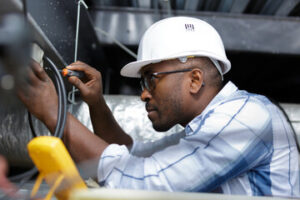An expert electrician can be invaluable to a building, company, or construction site. There are a number of different qualifications and experiences that a person must have to become an expert. Expert electricians are skilled in the inner workings of electrical systems. They know where to turn off the electricity, how to detect electricity safely, and how to prevent short-term safety hazards.
 Various electrical problems may arise, ranging from figuring out why an outlet sparks to finding the most cost-effective wiring method. Electrical engineers must work with various people, including construction teams and the general public. As with any industry, electricians have to be professional and courteous. Read on to learn more about what it takes to become an electrical engineer.
Various electrical problems may arise, ranging from figuring out why an outlet sparks to finding the most cost-effective wiring method. Electrical engineers must work with various people, including construction teams and the general public. As with any industry, electricians have to be professional and courteous. Read on to learn more about what it takes to become an electrical engineer.
You must have strong deductive reasoning and communication skills as an expert electrician. Good hand/eye coordination and good motor skills are also required. You should also be able to manage your time effectively.
The job of an expert electrician is to install, maintain, and repair electrical systems and appliances. They are responsible for ensuring safety in the workplace and complying with regulatory standards. Electricians can work independently or as part of a team. An electrician must be familiar with electrical safety guidelines and know different kinds of electric devices. He or she must also be able to troubleshoot malfunctioning equipment.
Electricians may use cable testers, ammeters, and wire strippers to test the function of various components. They also install intercoms, street lights, and other fixtures. Electricians use hand and power tools to do their work. Some of these tools include conduit benders, saws, and wire strippers. In addition, Electricians need to know how to read blueprints.
Aspiring electricians must possess the necessary skills to perform their jobs well. They must also have the determination to work in difficult situations. Depending on the type of project, they may be called to work independently or as part of a team.
Many electricians specialize in service calls, while others prefer to work on new construction. In either case, they are responsible for carrying out their duties according to the job’s specifications. Strong manual dexterity and hand-eye coordination are ideal for the job.
Electricians must have the ability to climb ladders and handle heavy materials. They should also be able to balance and maneuver in tight spaces. A good working knowledge of math and science is beneficial. Some of these skills can be learned through apprenticeship programs, while others can be acquired through a college degree.
If you are a professional looking to expand your horizons, consider obtaining a master electrician’s license. This type of license is a certification that gives you the authority to bid on public and government projects, and it comes with the added bonus of increasing your earning potential.
There are many ways to get an electrical license. You can take an accredited course or enroll in an apprenticeship program. The first is the most important, and it pays to have a plan in place before you embark on the journey.
Becoming an electrician is no easy feat. It would be best if you had a degree in electrical engineering, an aptitude test, and two years of experience as a journeyman. After you have completed these requirements, you are ready to apply for your master electrician’s license.
When the first Russian Technical Society exhibitions took place in the late 19th century, electrical engineering was a relative newcomer. It was unsteady and controversial, and many experts and laymen weren’t sure of its significance. However, these exhibitions brought electrical technology to the masses, which was important for the country’s development.
One of the first activities of the Electrical Engineering Department of the Technical Society was to organize special exhibitions. These were meant to demonstrate success in a specific field of technology. The VI department of the TS had its own printed organ, which provided information about the latest achievements in electrical engineering.
When you are working in a construction site, it’s important to follow safe work practices. This will reduce your chances of injury or death. You’ll need to wear protective equipment, use proper techniques and procedures, and maintain your tools and equipment.
For example, when you’re driving through a work zone, make sure to back up a distance away from the vehicle in front of you. In addition, you should use a mirror when you’re parking. If you’re operating low-voltage equipment, have technical specifications and wiring diagrams on hand.
In addition, you should also pay close attention to any signs or warning devices on the road. These devices may be energized and can cause shocks or explosions.